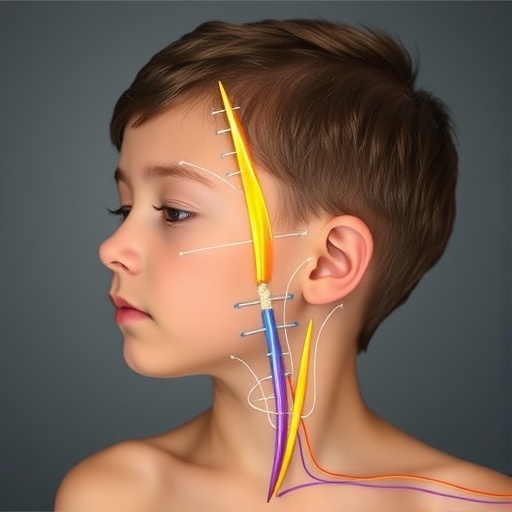Emerging research in neuropsychiatry is continually shedding light on the intricate mechanisms underlying Autism Spectrum Disorder (ASD), offering new hope for therapeutic interventions. A groundbreaking study recently published in Translational Psychiatry unveils a promising non-pharmacological treatment approach that harnesses the body’s own nervous system and microbiome communication channels. This innovative research reveals that electroacupuncture, a modern adaptation of traditional acupuncture techniques, can significantly ameliorate ASD symptoms by modulating the gut-brain axis, contingent upon the functional integrity of the vagus nerve.
The gut-brain axis, a bidirectional communication network linking the central nervous system with the gastrointestinal tract, has garnered substantial interest for its role in neurodevelopmental disorders, including ASD. Abnormalities in gut microbiota composition and gastrointestinal symptoms are frequently reported in individuals with ASD, suggesting a pivotal role for gut-brain interactions in symptomatology. The vagus nerve, the longest cranial nerve, plays a crucial role in this axis, facilitating neural and neuroimmune communication between gut and brain, thereby influencing emotional and cognitive functions.
In this study, researchers employed a sophisticated animal model replicating core ASD characteristics, enabling an in-depth exploration of electroacupuncture’s therapeutic potential and its dependency on vagus nerve integrity. By strategically targeting specific acupoints with electrical stimulation, the intervention aimed to recalibrate the dysregulated gut-brain network. Electroacupuncture’s impact was assessed through behavioral tests, gut microbiome analyses, and neurophysiological assessments, providing a multidimensional view of its efficacy.
Behavioral outcomes were striking. Subjects receiving electroacupuncture exhibited significant reductions in social deficits and repetitive behaviors emblematic of ASD. These improvements were coupled with enhanced exploratory behavior and reduced anxiety markers, suggesting that electroacupuncture’s influence extends beyond mere symptom suppression to broader neuropsychological benefits. Notably, these behavioral gains were nullified in subjects with surgically severed vagus nerves, underscoring the indispensability of vagal integrity in mediating therapeutic effects.
Microbiome profiling using cutting-edge sequencing techniques revealed substantive shifts in gut bacterial populations post-treatment. Electroacupuncture induced a normalization of microbial diversity and abundance, reversing ASD-associated dysbiosis. Perturbations in key bacterial taxa correlated with symptom severity were diminished, indicating that targeted modulation of gut flora is a mechanism through which electroacupuncture exerts its influence. This finding presents compelling evidence for the gut microbiome’s role as a mediator of neurodevelopmental health.
Neurophysiological analysis through electrophysiological recordings and neuroimaging techniques illuminated enhanced vagal tone and brain connectivity alterations following electroacupuncture. These neurobiological changes were consistent with improved autonomic regulation and synaptic plasticity, mechanisms essential for cognitive function and social behavior. The results align with emerging views that neuromodulation therapies can recalibrate dysfunctional neural circuits in ASD, marking a potential paradigm shift in treatment strategies.
Importantly, the study delineated the necessity of vagus nerve integrity for the modulation of the gut-brain axis. In vagotomized subjects, electroacupuncture failed to produce significant behavioral or microbiome changes, definitively implicating the vagus nerve as the critical conduit. This finding not only elucidates the mechanistic underpinnings but also implicates vagus nerve status as a predictive biomarker for treatment responsiveness.
The translational implications of these findings are profound. Current pharmacotherapies for ASD often target isolated symptoms and are accompanied by adverse effects. Electroacupuncture offers a holistic, minimally invasive alternative that leverages endogenous neurophysiological pathways to restore systemic balance. Its potential for integration into multimodal treatment regimens could revolutionize clinical approaches, particularly for patients refractory to conventional therapies.
This research also stimulates a broader reconsideration of traditional medical practices through the lens of modern neuroscience. By scientifically validating electroacupuncture’s bioelectrical modulation capabilities, the study bridges ancient healing arts with contemporary biomedical paradigms, fostering a convergence that may expedite novel therapeutic discoveries for complex brain disorders.
Moreover, the elucidation of gut-brain axis dynamics emphasizes the necessity of a multidisciplinary approach encompassing neurology, gastroenterology, microbiology, and psychiatry. Future research must explore the molecular mediators linking microbial metabolites, vagal afferents, and brain circuits. Profiling cytokine signaling, neurotransmitter fluctuations, and gene expression patterns post-treatment could further unravel the intricacies of ASD pathophysiology and recovery.
The study also raises intriguing questions about individual variability in treatment response. Genetic predispositions, environmental factors, and baseline vagus nerve function could all influence efficacy, advocating for personalized medicine frameworks. Biomarker development for patient stratification and real-time monitoring of gut-brain axis activity will be critical for optimizing electroacupuncture protocols.
In conclusion, the demonstration that electroacupuncture ameliorates Autism Spectrum Disorder symptoms via vagus nerve-mediated modulation of the gut-brain axis constitutes a landmark advancement. By integrating behavioral, microbiological, and neurophysiological evidence, this research illuminates a new horizon for ASD therapy that transcends conventional boundaries. As the scientific community continues to decode the language of the gut-brain connection, this work provides a compelling blueprint for future interventions aimed at restoring neurodevelopmental harmony.
The promise encapsulated in these findings extends beyond ASD, suggesting that electroacupuncture and gut-brain axis modulation might hold therapeutic potential across a spectrum of neuropsychiatric disorders where dysregulated neural-immune-gut interactions are implicated. Continued research and clinical trials will be pivotal in transitioning this therapeutic approach from bench to bedside, heralding a new era of neurobiological restoration and improved quality of life for millions affected by these complex conditions.
Subject of Research: The investigation focuses on the therapeutic effects of electroacupuncture on Autism Spectrum Disorder through modulation of the gut-brain axis, with a specific emphasis on the functional role of the vagus nerve.
Article Title: Electroacupuncture ameliorates Autism Spectrum Disorder via modulating the gut-brain axis depending on the integrity of vagus nerve.
Article References:
Chen, D., Yang, X., Jiao, D. et al. Electroacupuncture ameliorates Autism Spectrum Disorder via modulating the gut-brain axis depending on the integrity of vagus nerve. Transl Psychiatry 15, 428 (2025). https://doi.org/10.1038/s41398-025-03637-4
Image Credits: AI Generated




